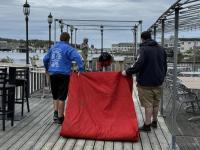Cell towers cause concern in East Boothbay
A handful of East Boothbay residents who call themselves the “Our TOWN” Committee (Towers Only Where Necessary) showed up at the June 12 Boothbay selectmen's meeting to request a moratorium be placed on new cellular communication towers erected in Boothbay.
In March, a cellular company visited an Ocean Point property to evaluate sites for a potential 120-foot cell tower, according to Ocean Point resident Brad Betts. Betts inquired if the cell tower could legally be built in a residential neighborhood. The company representative indicated that it was possible.
“I understand that this company has been looking at other prospective sites in and around the Boothbay area for this type of tower,” Betts said.
The Our TOWN Committee told the selectmen that Boothbay’s current land use laws don’t adequately address cell phone towers, and indicated that the Federal Communications Commission has the power, under the Telecommunications Act of 1996, to overturn local zoning laws.
The telecommunications act has made it easier for cell phone companies to obtain permits to build towers. According to a 1999 Washington University Law Quarterly article, cell phone carriers are protected from unreasonable discrimination by towns prohibiting wireless services.
If a cell phone carrier finds it necessary to provide service to customers, then the FCC will provide full backing, which often trumps town governments in a higher court of law.
Selectman Steve Lewis said the town consulted with its attorney Sally Daggett, and they feel the Boothbay’s ordinances do not discriminate unreasonably against cell towers, and that a moratorium was unnecessary.
The Our TOWN committee felt a moratorium could buy time to better understand the inner-workings of telecommunications regulations and how they apply with zoning ordinances. The town could then be prepared if an application is submitted, and know what other options are available, said Ocean Point resident Jean Reese-Gibson.
“We have not got the kind of control and the kind of guidance that other towns have taken the time to obtain,” Reese-Gibson said. “When someone come is and puts an application on the table, this is a proft-making company from out of town. All they want to do is come in and get their tower in. They don't care what it looks like. They don't care where it's going, as long as they get it where they want it to go.”
The selectmen argued that the town already has a system of checks and balances in place to negotiate and judge legalities.
Selectman Lewis said if the Our TOWN committee is truly serious about beefing up the ordinances, then they are welcome to participate in the ordinance review workshops currently happening with the planning board, or petition for an ordinance change via a town meeting.
“I'm astounded that the town is interested in putting all of its criteria and decision making, all of its judgment in the hands of three, four, five individuals, not knowing who those individuals will be at any given time, and not giving them any type of bible to go by,” Reese-Gibson said.
Selectman Dale Harmon said he is sympathetic with the committees’ concerns, but he is hesitant to permit a moratorium, when it’s endorsed by a just small sample of Boothbay’s residents, rather than the whole community.
The Our TOWN Committee’s next step is to offer their assistance to the town to draft an ordinance that specifically addresses cell towers. In an email from Betts, he wrote: “The purpose of this ordinance would be to make sure there are adequate provisions for public noticing, and for reviewing alternative sites, visual impacts, setbacks from residential structures, and other potential concerns associated with communication tower placement ….
“The most important thing is to make sure that the people who live in this town are informed and that applications for new towers are based on our town’s needs, and not driven solely by the demands of individual communication carriers,” Betts wrote.
Event Date
Address
United States





















